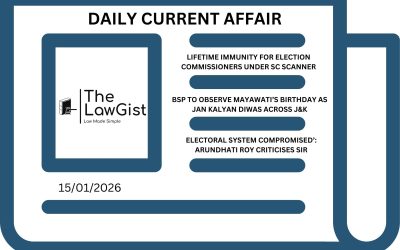
Sharmistha Panoli’s arrest for an Instagram reel reveals India’s growing intolerance toward dissent and digital expression.
DEMOCRACY DIES IN SILENCE: SHARMISTHA PANOLI EMERGES AS ITS LATEST VICTIM
Gist of the NewsIn the world’s largest democratic country – a reel landed a law student behind bars. What’s worse? The state acted faster on her than it does for actual crimes. Democracy Dies in Silence: Sharmistha Panoli emerges as Is Its Latest Victim.
|
Overview
When a 22-year-old law student becomes the target of a full-blown state operation not for inciting riots, not for planning violence, but for posting a reel, you know democracy is not under threat; it’s being strangled in broad daylight. Sharmistha Panoli didn’t commit a crime. She exercised her voice. And for that, Kolkata’s political machinery pounced, arresting her from another state, jailing her, and silencing her all while the Chief Minister’s office watched in silent approval. This is not governance. This is fascism disguised as law and order.
Behind the legal jargon is a deeply disturbing reality, one where a young woman is being punished for her politics, not her actions.
- This is not just an arrest, it’s a state-sponsored manhunt.
- A law student was arrested across state lines for an opinion.
- Her reel wasn’t hate speech, it was criticism.
- And Mamata Banerjee’s police crushed her right to express it.
Key Aspects
Every procedural safeguard was bulldozed in this case with politics driving every action, not justice.
- Arrested in Gurugram by Bengal Police without proper jurisdictional coordination.
- Bail denied; judicial custody granted.
- Allegations of hygiene violations and mental trauma in jail.
Legal Insights
The law is clear. The Constitution is clearer. But none of it mattered to the Bengal Police when silencing dissent took priority.
- Violation of Article 19(1)(a) – Right to Free Speech: Her reel was a personal commentary not hate speech. Article 19(1)(a) guarantees every citizen the right to express, criticize, and question, especially the government.
- Arrest contrary to SC ruling in Arnesh Kumar vs. Bihar (2014): The Supreme Court clearly directed that arrests under bailable sections must be justified with necessity. No such justification exists here, only a political agenda.
- Bailable sections abused to detain a student for political optics: Most sections invoked under the Bharatiya Nyaya Sanhita are bailable, making her arrest and denial of bail deeply suspect. It’s not about law, it’s about optics and intimidation.
An FIR has been registered at Garden Reach Police Station, Kolkata, under Sections 196(1)(a), 299, 352, and 353(1)(c) of the Bharatiya Nyaya Sanhita (BNS).
Impact
This case is a blow to India’s conscience. It tells every student, influencer, or activist: “Speak against us, and you’ll be next.” This is not governance, it’s vindictive tyranny.
Conclusion
What we are witnessing is not law and order, but political cruelty. Sharmistha Panoli stood up, and the state slapped her down. But history has shown the truth doesn’t stay locked up for long.
- Sharmistha Panoli is not the criminal.
- Mamata Banerjee’s regime is for weaponizing the police against voices of reason.
- We must stand with her. Because today it’s her. Tomorrow, it’s you.
“When a reel costs you freedom, the system isn’t protecting democracy — it’s punishing it.”
Sources
ALSO READ – Bharatiya Nyaya Sanhita – The LawGist
WRITTEN BY – SHRAVANI SRINVAS
EDITED BY: NANCY SHARMA






